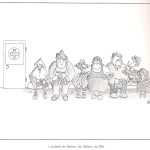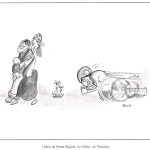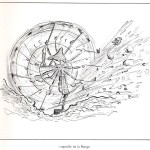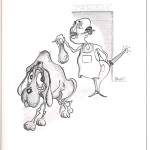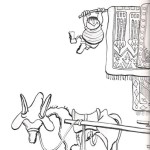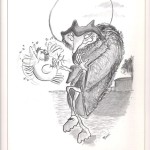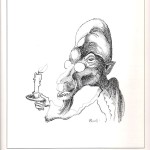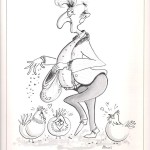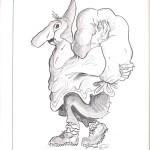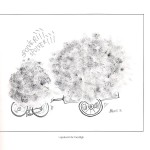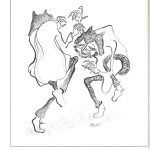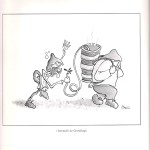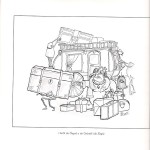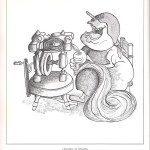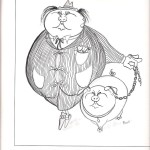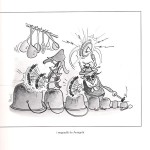I Blasons popolari, included the popular tradition of preference judgments praising or insulting about other countries, on the different regions, provinces, towns and villages, each of them were attributed to very specific epithets (more or less extensive), with an ambivalent meaning (albeit with a certain predominance of disparaging) […] I shields popular are deeply ambivalent. Each nation, province to the city is the best in the world for something specific: The British are more drunks, the inhabitants of Lorraine the most powerful sexually, Avignon are more than elsewhere, women of easy virtue, Bretons are the most foolish of all, etc.., but this sign has in most cases a double meaning, or more exactly is double (stupidity, drunkenness, etc.,). Accordingly, praise and insult blend into an indissoluble unity. […] Usually the shields Popular qualify as ironic, in the original sense of the term greek, but it is false if it gives a new meaning, more subjective and negative.
Children, the boys were soon in contact with the “blasoni popolari”, in other words with the nicknames, with nicknames / soernóm as we call them, Styling, characterize the various countries as if they were securities, Coat of Arms, flags. There are, evidently, the various countries that are given these nicknames, are neighbors if they climax they hitch between them.
The parochialism plays, which, a very important role: is ridicules, mocks or maybe you also get to do backbiting or even slander the country near, exaggerating and exacerbating the moral or physical defects of the inhabitants, or being ironic about their activities, about their eating habits, on their traditions, the way they talk, dress…
VALLE Serina
| i paerane SREPi gós SREPi lignér SREPi braghi of Frèdol
i padèle of Frèdol i fasòlér (the fasòlòcc) de Rigusa i brustiilìcc de Sambusita I litiganc de Braca i I rampi de Braca I bar of Cornólta |
gli gigolo Pagliaroi gozzuti Pagliarothe woodshed Pagliaroi braghini di Frerola
pans di Frerola the fagiolai of Rigosa the roasted The Sambusita quarrelsome di Bracca the attabrighe di Bracca i montoni of Cornalta
|
| in patate COSTi barbèi the Sensai carnàss of Tretegàncci moète e bernàs Amber
i boassù of Cornalba ì àsegn of Cornalba and ciodarói Serina i boscaròi Serina Bassa the piassaròi Serina olta ì bórga1 lip i GACC lip i strachì of Alpiana The chissoi de Oltralcòl i bo,asse Collect the Bassa Baloch in the Collector Oltà the cavrècc de Zurzù
I macc of Dossena i baciòch of Dossena |
le patate Costa Serinale farfalle Ascensioni catenacci of traffickerssprings and blades of Ambriola
the cow dung Cornalba donkeys Cornalba manufacturers of nails di Serina those of the forest di Serina Bassa those of the Square Serina Alta i borga di Lepre i gatti di Lepre the stracchini di Vaipiana i chissòi (Brostolot = polenta and strachi) de Over the Hill the dung di mucca di Zambia B i balòch Zambia High i capretti di Zorzone i matti di Dosséna i battacchi di Dosséna |
| Bigo and Nèmberì of pucia of Nèmberi bites Nemba
and stórc de 'tear Slaughter and NES i gnoràncc / Vilanch Mut Born i bucì de Óléra in angadùr deTór i sapadùr de la Ranga and reulta-plòch of 'EIA MIDDLE VALLEY SERIANA in GOS of Cenel i OS-de Gasaniga i sciòre of Gasaniga and to pray cavrècc holders of Fiora-Lecca i teedèi de Értoa i bròcc de Smùt i storcc de Smùt Colzate and cam rape then the blaze de Bont i brinàcc de Sedrina and Mussa-nail Sedrina * ciaèle and the Boot Maya-Pult and the Boot |
The bigoli of Nembrogli gravies Nembrogli stonemasons Nembro
They raise the Crank the ammazzacani Nese the ignorant / peasants of Monte di Nese calves Olera the vangatori Torre Boldone diggers Ranica the rolling stones Villa goiters of Dinners the hosts of Gazzaniga the lords of Gazzaniga kids of Orezzo bedbugs Fiorano which dealt with noodles the bad of Semonte Crank the Semonte i cam (?) Colzate sellers of chickens Colzate the frost covered Sedrina shows the asses of Sedrina keys Botta eating the porridge of Botta |
LOWER VALLEY SERIANA
– the Tacu * de Aviàdech the topponi Aviatico
– i was amazed of the wicks of Ama Ama
– the mice sorèch de Amora Amora
– i topenére de le Talpe in Double Dual
– i mòcc de i muti in Double Dual
– i patatù de i patatoni in Double Dual
The pissa Mantei de-Selvi the boastful (?) Selvino
– the falìcc de 'LBI bankrupts Albino
– the cirimbì de 'LBI dandies of the Albino
– Lader and desensin of bricks and di Desenzano
– i fich (d’àsen) de Bónt 1 figs (d’asino) di Bondo
– the tétoi de Fiòbe of boiled chestnuts Fiobbio
– and bade them to my tree Abbazia di
– i biligòcc de la Alóta le castagne lesse di Vall’Alta
– the segadùr de Casa1 mowers Casale
– Dope de Comendù double Comenduno
– the asòi de Pradalónga beans Pradalunga
– the coderòcc de Pradalónga the quarrymen of whetstones of Pradalunga
*Tacù: “toppone; more pieces of linen cloth overlaid one another, sewn together and fixated in the guise of coltroncino. Mettesi under the child restraint to the urine, in the prevention of bed
——
| VAL GANDINO coertì and LEF i sgiunfù de Léf the codeghi de lef
sù de Pèa Gandino i pumpùs Candie i fis Candie
|
the Copertini di Leffethe boastful di Leffei cotechini di Leffe
i maiali Peia i pomposi Gandino the balls Gandino
|
i bucì of Casnìch i vitellini Casnigo
i copazét of Casnìch the ammazzagente Casnigo
It's Riso
i lósérte de Nòssa they lucertole Nossa
i smèrda-bachècc de Nòssa gli SMERDA shoulder Nossa
i luf alégher Coren wolves cheerful Gorno
i cornage de Onéda the crows di Oneta
i burlapóm of Prémol Roll the apples Premolo
i scarpinòcc” of Par the Scarpinocc di Parre
——
| Valle Brembana | |
| i brinàcc de Sedrina and Mussa-nail Sedrina * ciaèle and the Boot Maya-Pult and the Boot | the frost covered Sedrinashows the asses of Sedrinakeys Bottaeating the porridge of Botta |
|
When the road was built in the sixteenth century Priula, the close of Botta was passed with a pass suspended and bound Brembo leaning on the rock and supported by key (iron bars and chains) this CIAF of the mur ciaèle. This step, very dangerous, will remain until the beginning of the nineteenth century. |
|
| i cìcia-tétole of clansi màia-fich de Òbiàli /Pure mórcc de Òbiàli briìsàcc de Òbiàl
i liif de Brembìla i aocàcc of Catremér i bandunàcc of Sant'Antone
the spinaràcc deBlèl Gerosa i / borlài by Cerus i soli by Cerus
i miìi de Zógn i corér de Stabèl
|
i succhia castagne Clanezzoi eat figs Ubialei morti di paura Ubialei bruciati Ubiale
i lupi Brembilla lawyers of Catremerio the abandoned di S.Antonio
in pungitopo di Blello the rolling logs Gerosa the floor layers Gerosa i muli Zogno couriers of Stabello i muli di Zogno couriers Stabello |
| and Buli of POSCOthe castegnù de Poscànti tachì two Gròmèli oselì two Endèna
in pégher the Endèna I téta péger di Somendenna i Miserere Somendèna and rastelù of Miràguel and reloér of Miràguel and Merit of Ambria games at the Spi i magnèsie de San Pelegrì i Peli de San Pelegrì i beesi de San Pelegrì i tàcoi de Santa Crùs And peladèi San Cioàn the grataròi de San Cioàn i bómbe9 de San Cioàn Maia and letter-San Cioàn i Boassi of Fópià i tripini de San Gal and Maia-mórcc of Camerada Marmor and Cornelia i òmbrelér of Orbrèmb
|
bulletti of Poscantei castagnari of Poscanteporters Grumellothe birds di Endenna
le pecore di Endenna sucks the sheep of Somendenna in miserere of Somendenna the rastrelloni of Miragolo watchmakers of Miragolo i ballerina of the di Ambria le spine Spino
the magnesia di S.Pellegrino i pelini di S.Pellegrino small drinkers di S.Pellegrino le taccole di Santa Croce
le castagne lesse di S.Giovanni the Grattaroli di San Giovanni the bomb di San Giovanni i eat paper di San Giovanni the cow dung Fuipiano le tre galline di San Gallo
mangia in morti Camerata the pots Cornelius the umbrella- di Orbrembo |
THOSE OF LOW
Those in the low-, those of the plain that is, we were called was. If you consult Tiraboschi II, reads: “It was, the one who works the land with oxen; but we say it more often disparagingly of an inhabitant of the county, and, more particularly of the plain. Our Bolo corresponds precisely to de Glebalis servus’ Latin, chiamavansi name by which those slaves who were dedicated to the cultivation of the land. Greco BwXocr gleba, country”. In an appendix to the vocabulary reads. “Add: spagnolo bolo and bolonio = balordo, stunned”. We must also bear in mind that, once, many boys of our party ended up doing 'I famèi, young, in the plains where they had a really miserable life, exploited to the maximum and badly treated and fed. Non deve, then, surprising that the hatred, with time, had arisen against “those of the low”; hatred that had materialized in the derogatory term of was. Masters, doctors, pastors, municipal secretaries, Sellers… who came from the lower were, at least at the beginning, seen with coldness, with detachment and avoidance tati, if not opposed, because was, yokels and then, above all, exploiters in the worst sense of the term.
Children, the boys drew great fun to these blazons villagers, these strange and picturesque sòernóm; vied to those who know more, who was there to c to combine it with many countries as possible. These same coat of arms, however, for boys BECOME1 biggish, from occasion to demonstrate alertness and good memory, were transformed, well quick, and pretesto, starting point in order to give vent to the turf alive, among adults, until a few years ago.
This parochialism put in antagonism, in opposition not only children of neighbors who were in contact with each other at parties, visits to shrines, markets, le fiere… but also boys fractions of the same country, or even groups of families of boys of the same fraction, boys, namely that attended the same school, the same steps of the parish, playing together.
During these contacts (and not just those random with neighboring countries), not easily say inevitably, you could get to sfottersi, a deridersi, to exchange pranks, Jokes, insults, nomignoli, certainly not flattering appreciations. The Upside, cracks, zuffe, spedi– punitive were not always avoidable and were not always painless, often leaving the consequences and aftermath.




